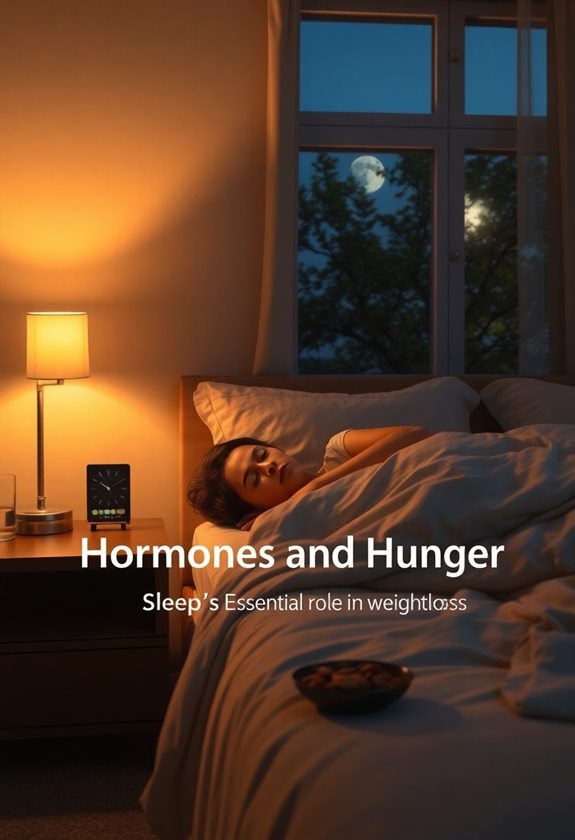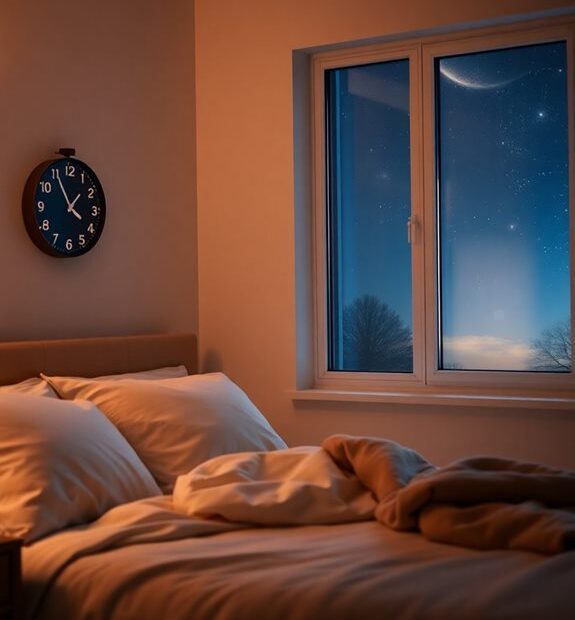Sleep is essential for your weight loss journey. When you sleep well, your body repairs itself 🛌 and burns calories more efficiently. Did you know that lack of sleep can boost your cravings for junk food? 🍩 It also messes with your hunger hormones, making you feel hungrier. Plus, if you're tired, you might skip exercising, which can slow your progress. To help, stick to a regular bedtime and create a relaxing routine before sleep. Keep your room dark and cool, too. By prioritizing sleep, you'll set yourself up for healthier choices and better energy. Want to discover more tips?
Key Takeaways
- Quality sleep enhances metabolism, allowing the body to burn calories more efficiently and aiding in weight loss efforts.
- Sleep deprivation disrupts hunger hormones, increasing cravings for unhealthy snacks and making weight loss more difficult.
- Insufficient sleep leads to fatigue, reducing motivation for physical activity and hindering weight management.
- A well-rested individual is more likely to adhere to healthy eating habits and make better food choices.
- Establishing a regular sleep routine can significantly improve sleep quality, supporting effective weight loss strategies.
The Science of Sleep

Have you ever wondered how sleep affects your body beyond just feeling rested? It's more significant than you might think! When you sleep, your body goes through several stages that help repair muscles, synthesize proteins, and release hormones. This process is crucial for your overall health, especially when combined with the synergy of meal planning and exercise. During deep sleep, your body releases growth hormone, which helps with tissue growth and repair. Have you ever noticed how you feel energized after a good night's sleep? That's because quality sleep boosts your mood and sharpens your focus. You might even find it easier to stick to healthy eating habits when you're well-rested.
On the flip side, lack of sleep can lead to increased stress and cravings for unhealthy foods. You might feel more tired and less motivated to exercise. It's like a cycle that keeps repeating!
Sleep's Impact on Metabolism
Sleep directly influences your metabolism, impacting how your body processes food and stores fat. When you don't get enough sleep, your metabolism can slow down, making it harder to lose weight. Ever noticed how you crave junk food when you're tired? That's not a coincidence! Your body craves quick energy, which often comes from sugary or fatty foods. Additionally, poor sleep can lead to impulsive food choices and hinder your ability to stick to a meal plan, which is vital for effective weight loss the importance of meal planning.
During sleep, your body repairs itself and regulates important functions. A well-rested body efficiently burns calories and uses energy. If you're skimping on sleep, your body might not function at its best. Imagine trying to run a car on low fuel; it just won't perform well, right?
On the flip side, getting enough quality sleep can boost your metabolism. You might find it easier to maintain a healthy weight if you prioritize sleep. Think about it: wouldn't you like to wake up feeling refreshed and ready to tackle your day? 😴
In short, good sleep isn't just about feeling rested; it's essential for a healthy metabolism. So, how can you improve your sleep habits tonight?
Hormones and Hunger

When you don't get enough rest, your body's hormone levels can go haywire, leading to increased feelings of hunger. Have you ever noticed that after a sleepless night, you crave junk food more than usual? This happens because lack of sleep disrupts hormones like ghrelin and leptin. Ghrelin tells you when to eat, while leptin signals when you're full. Without sleep, ghrelin levels rise, and leptin levels drop. This imbalance makes you feel hungrier, which can derail your weight loss goals. In addition, consistent meal patterns, as emphasized in meal prep strategies, can help manage hunger levels effectively. Imagine it's late at night, and you're tired but still reach for a late-night snack. Sound familiar? This is your body's way of fighting against the lack of sleep. Plus, when you're tired, your willpower weakens, and resisting those cravings becomes tough.
Energy Levels and Physical Activity
Lacking adequate rest can significantly sap your energy levels, making it harder to engage in physical activity. When you're tired, even simple tasks can feel overwhelming. Think about it—how often have you skipped a workout because you felt too exhausted?
To illustrate how sleep affects your energy and activity, here's a quick look at different energy states and their effects:
| Energy Level | Physical Activity | Impact on Weight |
|---|---|---|
| Low | Little to no movement | Increases weight gain risk |
| Moderate | Light exercises (walking) | Maintains weight balance |
| High | Intense workouts (running) | Aids in weight loss |
When you get enough sleep, your energy spikes, making it easier to stay active. You might find yourself more motivated to hit the gym or go for a run. Isn't that what you want? Good sleep not only fuels your body but also supports your weight loss goals. So, how can better energy levels transform your daily routine? Remember, each healthy choice builds on the last! 🌟
Strategies for Better Sleep

Getting enough rest can dramatically improve your energy levels and, in turn, your ability to stay active. So, how can you guarantee you get the sleep you need? Start by setting a regular bedtime. Your body loves routine! Going to bed and waking up at the same time each day helps regulate your internal clock.
Next, create a calming bedtime ritual. Maybe you enjoy reading a book or sipping herbal tea. These small actions signal to your body that it's time to wind down. Have you thought about your sleep environment? Keep your bedroom dark, cool, and quiet. You might even consider blackout curtains or a white noise machine.
Limiting screen time before bed is also key. The blue light from phones and TVs can trick your brain into thinking it's still daytime. Try putting your devices away at least an hour before bedtime.
Lastly, watch what you eat and drink. Avoid heavy meals and caffeine in the evening. Instead, snack on a light, healthy option like yogurt or fruit. Remember, good sleep isn't just a luxury; it's essential for your health and weight loss journey! 🌙✨

